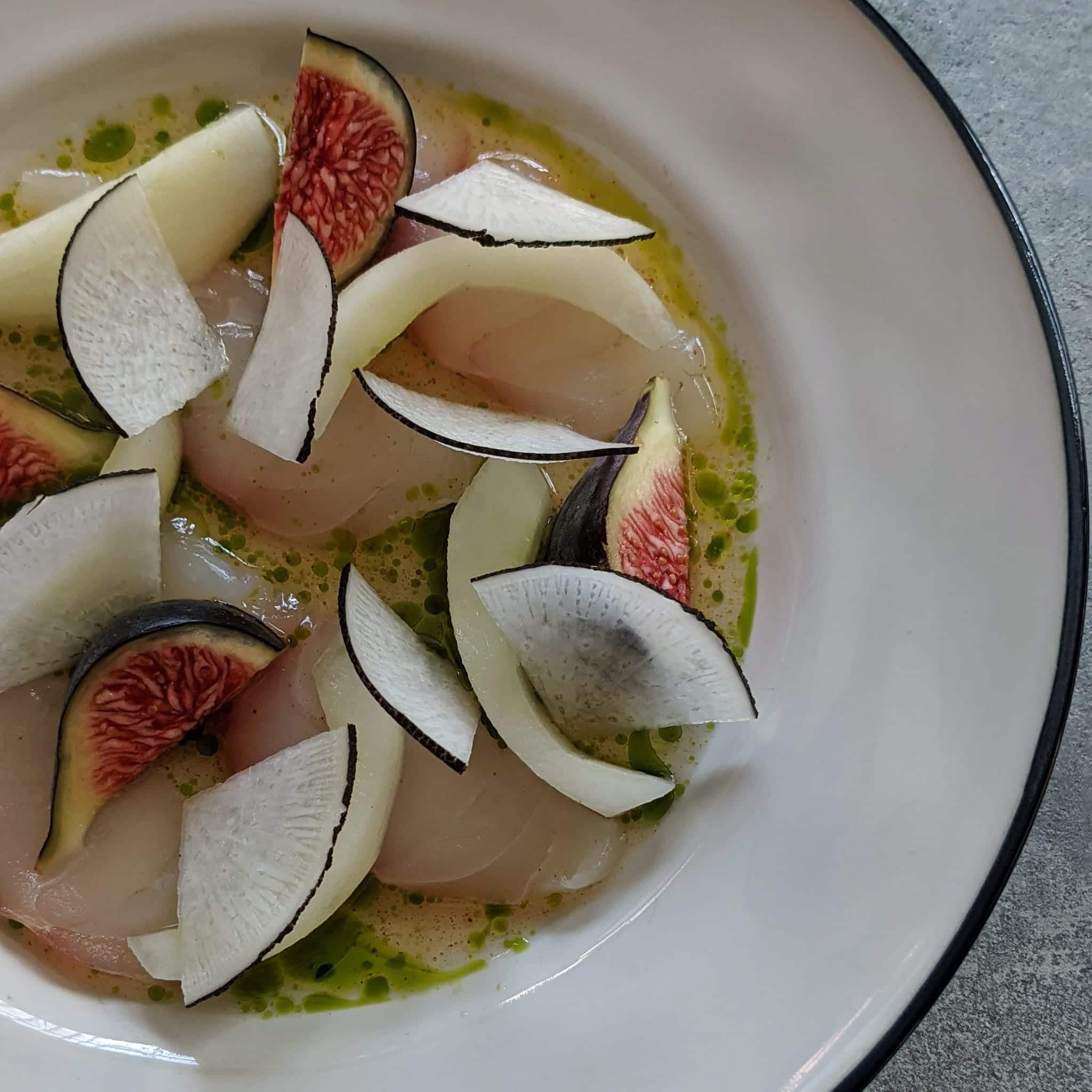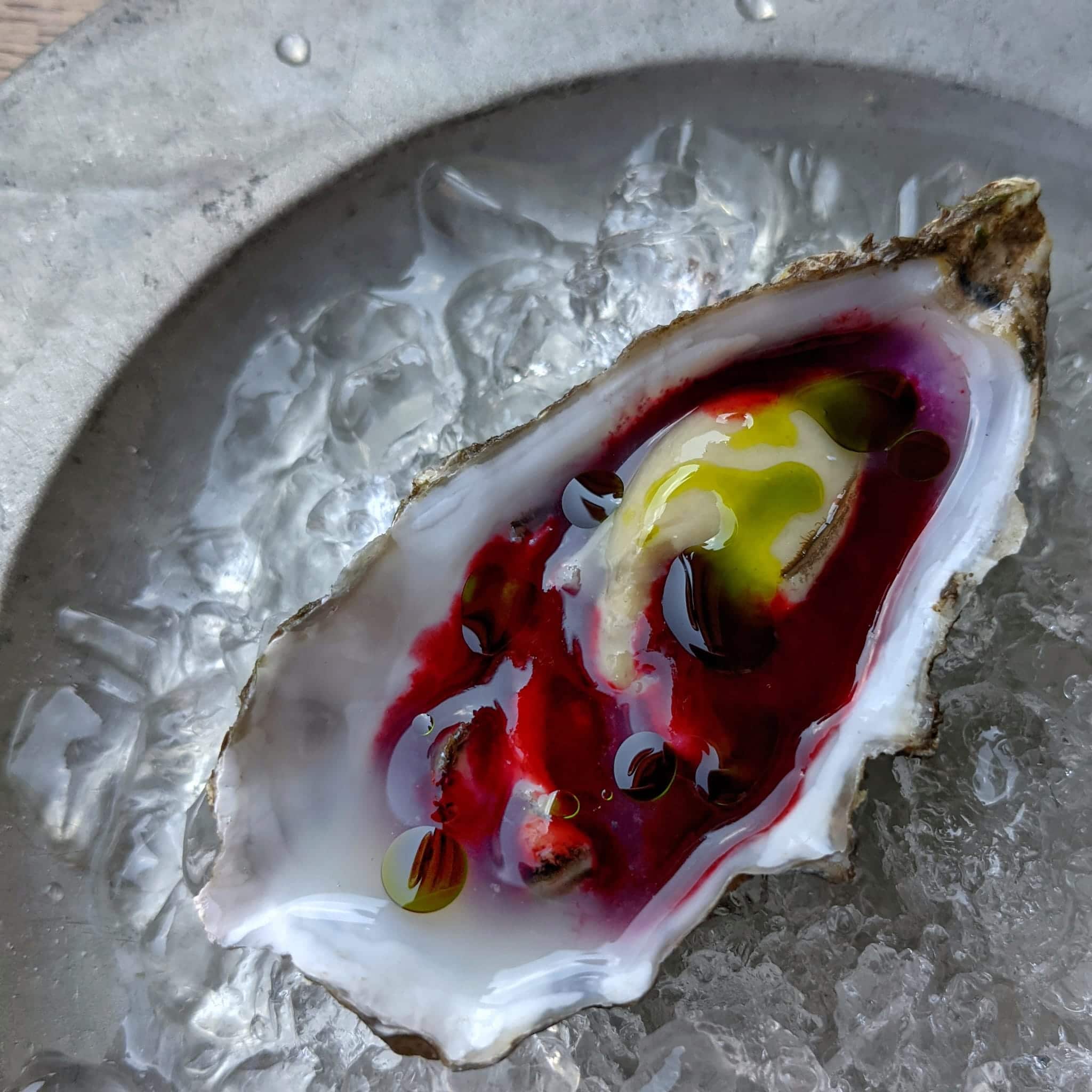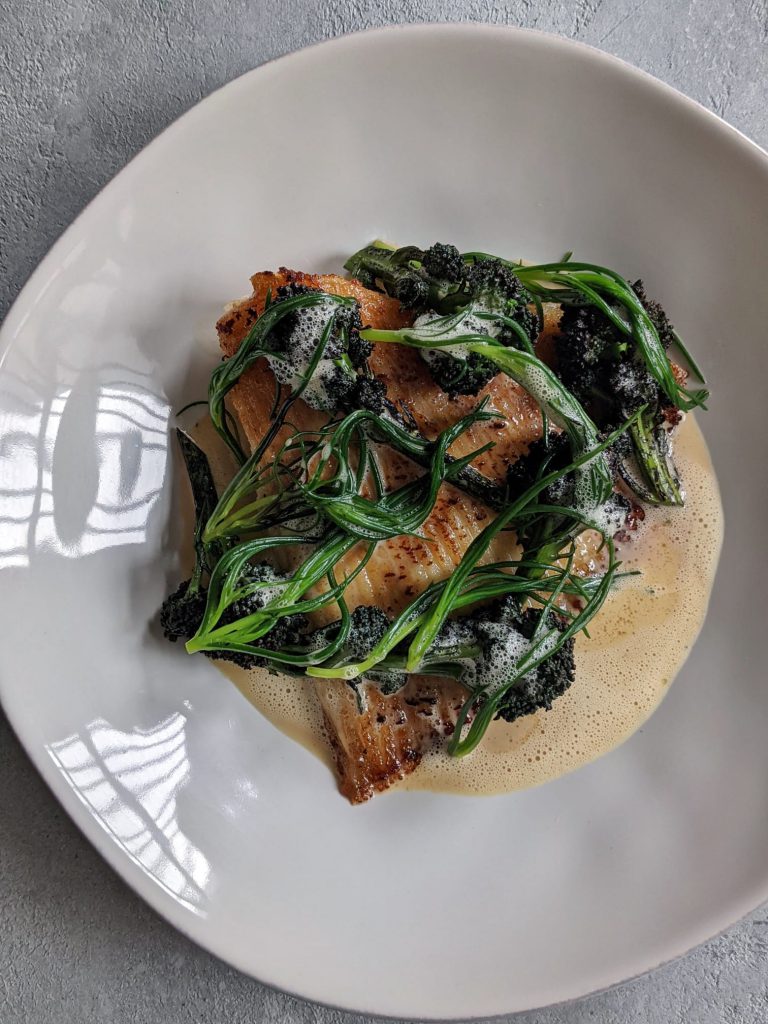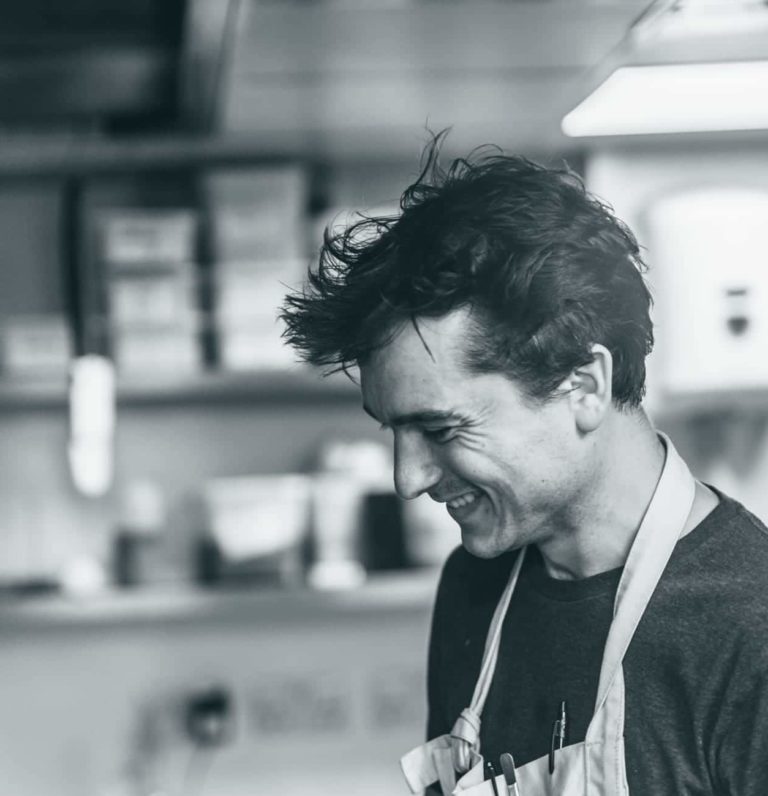“If you have people pulling up and parking their SUV, and then eating your sustainably line-caught Cornish sea bass and feeling like they’ve done their bit for the environment, for me actually that’s the opposite of what I want to be doing,” says chef Jackson Boxer, explaining how he interprets and uses sustainable food in his work and restaurants.
The erudite chef-owner of Brunswick House and Orasay restaurants in London is quick to caveat that he is not judging life choices, when the “odds for people changing how they live are so stacked against us”. But he is honest about how he sees his place, not only in the London restaurant scene, but the wider food system.
“You have some restaurants that are incredibly virtuous and diligent about sticking very closely to their philosophy. I’m thinking about restaurants like Silo, or Native, who are incredible proponents of a totally sustainable model of restaurant building. And are not only cooking delicious food but are attracting people who share their concerns. I think that’s hugely admirable, and fantastic that they make that work for them.
“For me, I suppose it was more about doing it by stealth. I wasn’t necessarily interested in preaching to the converted.”
It was also a little bit of worry, admits Boxer, that too much of a green thing can be off-putting for those just after a brilliant meal and a good night out.
“I suppose I was slightly worried,” he muses. “I didn’t necessarily want to put people off or get too bogged down in philosophising. For me, the better thing is making sure we’re as busy as possible and diversifying as much of our money as possible to these growers and suppliers, who are doing things in the right way.
“It is something certainly that we make sure our team is very much educated in, and it is something we’ve very excited to see more guests asking about. But I would also caveat that,” he pauses. “I don’t necessarily want to be a sustainable restaurant that makes people feel better about themselves.”

But whatever his motivation or views on sustainability, like thousands of other restaurateurs, chefs and hospitality workers, the last two years saw Boxer barred from work as the pandemic shut the doors on an industry that depended on footfall.
It was a desperately difficult time for the sector, and like others, Boxer and his team pivoted into meal delivery kits for home dining. He also believes closing restaurants had an unexpected benefit, as it brought home the less obvious social benefits they provide.
“Closing restaurants turned out to be the best kind of advertisement for their qualities – people stuck at home, stuck with their own cooking and Deliveroo became completely miserable,” he says.
“On a fundamental level, this is a job and you’ve got to have a job in order to keep a roof over your head. But what makes that enjoyable is the fact that it makes people very happy. And that has never felt more acute and pointed than seeing how much people missed the sense of being looked after that restaurants give them,” says Boxer, who talks quickly, in detail, and with the air of someone used to working in a fast-paced, lively kitchen environment.
His latest venture, Notting Hill-based seafood restaurant Orasay, opened just 10 months before the pandemic and was designed as a “celebration of British seafood and shellfish,”.
“Especially from the small day-boats that we work with all around the UK, so fish from the south coast, and seafood and shellfish from particularly from the North West of Scotland, which is where I have a very strong connection,” he says. But menus at Orasay are flexible and Boxer says he also resists a simple explanation for what he’s doing
Not least because his fishing boats don’t go out when the seas are stormy, so there’s less seafood and fish, but also because of the incredible competition in London’s restaurant world. “You need to be able to imbue it with a certain amount of magic, which can’t be whittled down to an investor’s pitch when someone comes along and says ‘I went to this great restaurant the other day and I think we should copy it’. And then there’s 10 of them across the country the next year,” he says.
Closing restaurants turned out to be the best kind of advertisement for their qualities – people stuck at home, stuck with their own cooking and Deliveroo became completely miserable. Jackson Boxer
There might be a bit of “magic” whatever that looks like, but credit probably also goes to what he calls “a foolish, misplaced confidence” he believes was fostered by his family and upbringing.
“My mum and dad are the most amazing, generous-spirited people, and my formidable grandmothers, both of whom were incredibly good cooks in different ways, gave me huge confidence about food. I’m one of those immensely privileged people who has always been plagued by doubts but it’s never stopped me doing anything,” he says.
The Boxer family food dynasty is well documented in most media interviews he has given (his grandmother was food writer Arabella Boxer, and family friends were the likes of Fergus and Margot Henderson), and he happily recalls a boho childhood in 70s south London, with shared houses that were full of food, fashion, art and communal good times.
It’s these convivial values of shared hospitality that seem to have largely driven how Boxer sees his role as chef and restaurateur, and the experience of a good restaurant.
“Anyone can teach themselves to cook after a while. But knowing how to look after people and take responsibility for people; the example they have set me has guided me in a huge amount of fundamental decisions,” he says.


That isn’t to say it’s all been plain sailing, and he’s been open in the past about a spiral of heavy drinking during his 20s – a downside of an industry built around extreme hours and hedonism. But today he is clear-headed and sharp, linking the food he cooks to complex wider food system issues with ease and flair.
Listing the sustainability credentials of his suppliers, and the pressures faced in the wider system, he says: “Most independent farmers I’ve ever have the pleasure of working with are deeply serious people who just want to do well, but they’re also under huge pressures.
“We work pretty much exclusively with producers who we consider to be regenerative. Which is to say we work with people who successfully attempt to invest more in their ecosystems than they extract. So for our growers that’s people who are very invested in biodynamics, which is kind of ‘organics plus’.
“All of our livestock come from polycultural environments whereby the animals are grazed outdoors all year round, part of a rotational system that benefits the soil. We try and work with dairy farms that stick to this, but dairy is a slightly difficult area as it is heavily industrialised. However, a lot of the small farms we buy cheese from do work in this way.
“Lastly fishing, if you look at fish numbers en masse, it’s a pretty bleak picture. You could easily say ban all fishing and have an incredibly diminished impact. Or huge trawler fishing, or aquaculture, which uses a lot of inputs.
“The more nuanced position I suppose is that we should stop industrial fishing. We should allow small fishing communities to continue to exist, because that is a way of life for coastal communities.”

There’s a handy way into ethical and sustainable sourcing, often stemming from good quality and flavour, both of which are always a favourite topic for any passionate chef.
“Most cooks are finely attuned to flavour and quality,” says Boxer. “And then you find that some suppliers have better produce than others, and you start to ask why and they say ‘oh I work with this one farm who we think are really good. And that’s why our broccoli is always more delicious than anything you’ll buy from someone else.’
“And you find out about that farm, and why it tastes better. And then you ask why are these salads from Italy so much more tasty than any of the English salads? And you find out that Italy has a different subsidy system that actually supports small growers rather than large agronomy.”
Of course, and as Boxer is well aware, sustainable food of this type comes at a price and it’s not one that most people in the UK can afford, especially as the cost-of-living crisis worsens.
How does a chef clearly passionate about sustainable food that he sells and cooks primarily for affluent people feel about this divide?
“I think we have to address questions of inequality when we talk about sustainability,” says Boxer. “I think it’s a mistake to wring your hands and just say ‘oh well, poverty exists therefore we can’t judge people’s diets’. We absolutely can judge that poverty, and we can judge those diets. And say it would be much healthier if people were provided with the means to eat well. And if that means eating less meat, then so be it.
Calling for cheap food “is a cop out”, according to Boxer, who believes it’s done “because people don’t want to address the fact the system is unequal”.
I think we have to address questions of inequality when we talk about sustainability. Jackson Boxer
“They should be asking why are they poor, why are they visiting food banks, and why are they deprived of the fundamental opportunity to live dignified existences? This is not just ‘the way things are’, there are things we can do to address that. To shy away from hard conversations, I think it’s a decline in our capacity for sound, democratic politics,” says Boxer.
It’s a hugely relevant topic after recent proposals to ban junk food advertising were rolled back on the pretence of helping people to afford food, plus the scary rises in everyday cost-of-living.
In any case, it’s clear that Boxer sees himself part of a network that is about more than just his diners. There’s his growers and producers, and his staff for another – a balance that he says has “shifted enormously” since he has got older.
“I’m totally preoccupied by things I’m excited to cook and teach my team to cook that I think they’ll be proud and excited to cook every day,” he says. “If only on the logic that it’s increasingly hard to find good, skilled and reliable and motivated chefs to come and work with you. Whereas London is a city of eight-10 million people, and you only need a couple of hundred of them to want to eat your food every day.
“Ultimately there should be pride and dignity in this work. And creating an environment where they’re not only well paid, but they’re also doing thing that gives people pleasure, and has a certain level of creative ambition and quality.”
Addressing social inequality and the changes required in our food system to tackle climate and biodiversity crises might seem incompatible, if not impossible, at times.
There might not be any quick-fix answers, but it’s a reminder of how a good chef can open your eyes, not just to the wonders of creativity and flavour in the kitchen, but the stories, challenges and impacts behind that food – in a way that takes you far beyond the confines of the plate.









0 Comments